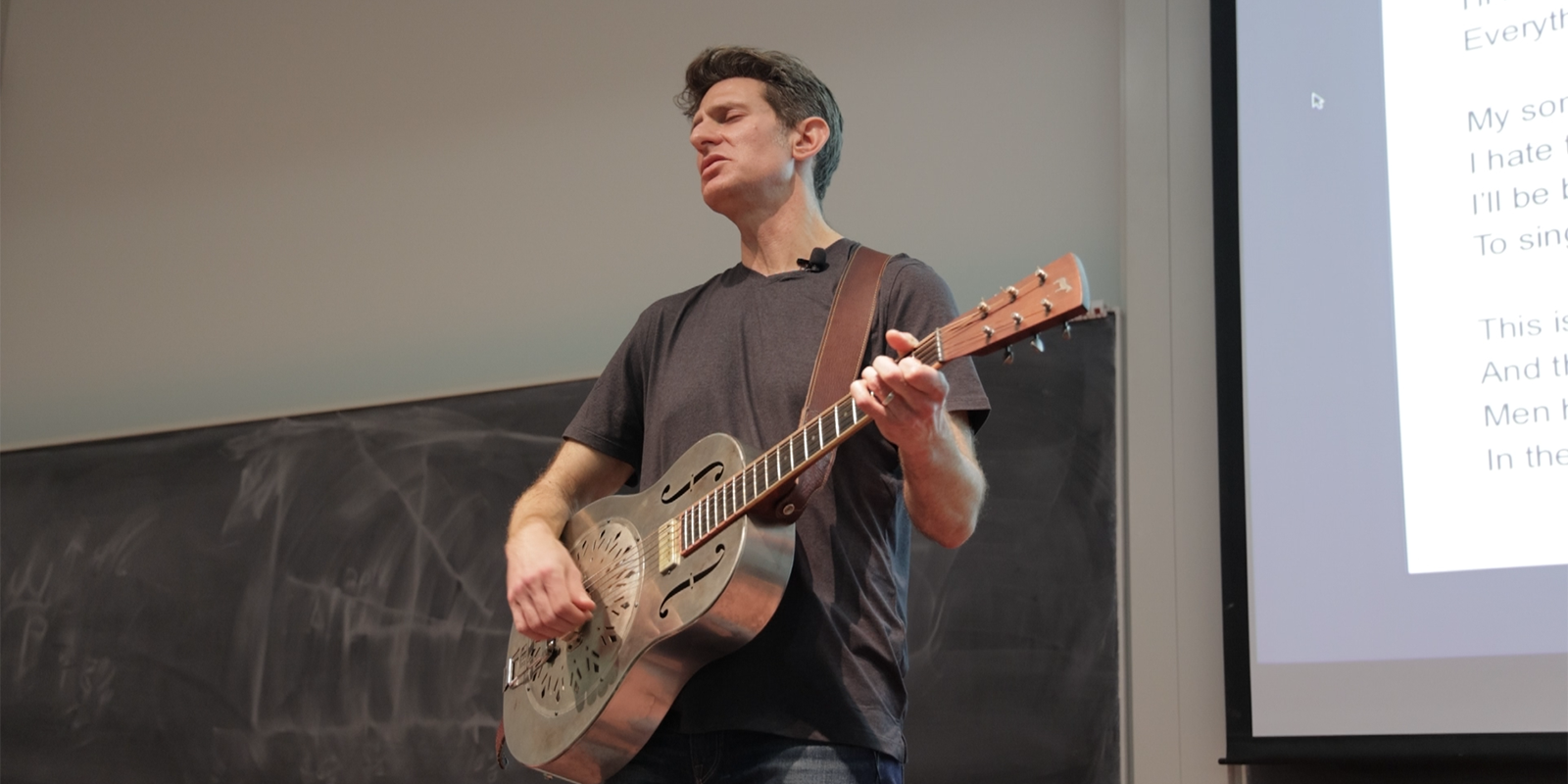The man on stage closes his eyes and begins to strum his silver guitar, swaying slightly with the melody, as he gently sings about pain, grief, and loss:
All of them were bone
All of them were blood
All of them were flesh
That somebody loved
Joe Goodkin (BA, Classics ’99) is singing ‘Somebody Loved,” the opening song of “The Blues of Achilles,” a 17-song cycle of folk music he composed and recorded based on “The Iliad,” the Greek poet Homer’s legendary 15,000-line epic poem. He’s performing it for a group of about 200 undergraduate students in Professor William Aylward’s Classical Mythology class.
“The Blues of Achilles” is Goodkin’s second conversion of Homer’s work into music—almost ten years earlier, he recorded a folk-opera version of “The Odyssey.” He’s now nearly 20 years into a musical career he lovingly dubs “weird,” touring and performing his songs for high school and college students in the United States and around the world.
“When you're doing something in a unique manner, I think it's great, because I'm not competing against a lot of other modern bards as far as I know,” says Goodkin, who first started playing guitar at the age of eight. “But you also don't really have any sort of roadmap or model to help you understand what you're doing. Who's just going around singing songs about Homer for almost 20 years now? I guess I am.”
Goodkin arrived at UW-Madison in the late 1990s like many 18-year-old do, having little idea what he wanted to do with his life. He considered becoming a psychology major, but all of that changed when he took classes on ancient Greek and Greek mythology from former Classics professor Barry Powell.
“Suddenly, I was a Classics major,” he says.
Goodkin found himself inspired by studying the Homeric epics from multiple points of view, but was particularly struck by the ways the stories were originally presented—in spoken word or song, by a single individual playing a single instrument.
“I thought it was interesting to see if I could recreate some of that experience through some of the types of music I was into—folk-rock, blues, singer-songwriter type stuff,” says Goodkin. “So, it almost started as a challenge to myself to see if I could do it.”
Thus began more than a decade of touring high schools in the United States, performing and talking with students. Goodkin then moved up to colleges, where he also found receptive audiences.
“I was really pleasantly surprised that I've developed this cool niche and relationships within the academic community that gave me a lot of work,” he says.
Writing songs based on “The Iliad” proved to be tricky. Homer’s “Odyssey” is shorter and easier for an audience to grasp. “The Iliad,” by contrast, features a cast of thousands, including several larger-than-life figures competing for narrative attention over the course of 52 days in a ten-year war.
“I knew once I found an emotional hook, I could see what sort of stuff I could write about and what stuff I didn't need to write about for this story,” Goodkin says.
Goodkin ended up having to ditch some of his favorite parts of the tale—there are no songs celebrating the embassy to Achilles, where Odysseus and Ajax try to convince the aggrieved warrior to return to the battlefield—but he also discovered fresh perspectives on other parts. Three of his songs give voice to the often-overlooked women in the tale—Briseis, Chryseis and Helen. The most surprising entry turned out to be “My Love for You,” a love song between Agamemnon, the leader of the Greek forces, and his brother Menelaus, the cuckolded husband of Helen of Troy.
“Everybody I've played it for has said, ‘I never thought about that spin with him,’” says Goodkin, who explains that he was trying to find a way to humanize a character who’s usually portrayed as a brutish pile of single-minded aggression. “This was like a creative problem that I confronted and then solved by writing this song.”
Goodkin typically performs with his eyes closed, both to honor the blind bard Homer and to avoid making direct eye contact with audience members, a move he believes prevents them being able to approach the songs on their own terms.
“I can hear the room, which is almost a better way to experience an audience anyway,” he explains. “I'm a believer in the idea that the audience determines the meaning of the work.”
Goodkin, who lives in Chicago, has no immediate plans to turn his songwriting attention to other classics, like Virgil’s “Aeneid.” He is in the early stages of adapting “The Blues of Achilles” into a larger, more conventional stage performance. He’s also drafted a script for a screenplay based on his experiences playing “The Odyssey.”
Mostly, Goodkin has been surprised and gratified by the strangeness of his journey, and the ongoing reach of his work.
“I've had people crying, which is good for this particular story, because you probably should cry if it's being done right,” Goodkin says. “If you can humanize this slightly strange story and make the audience think about it in a different way from whatever they got from the text or their professor, that's about the best feedback you can get.”
